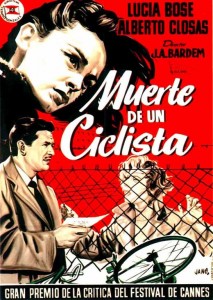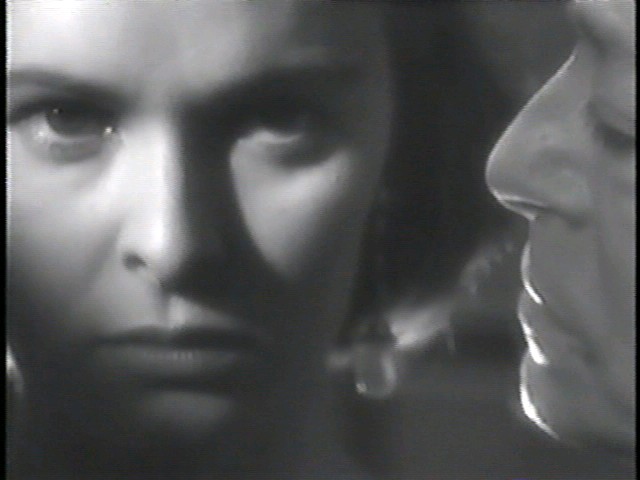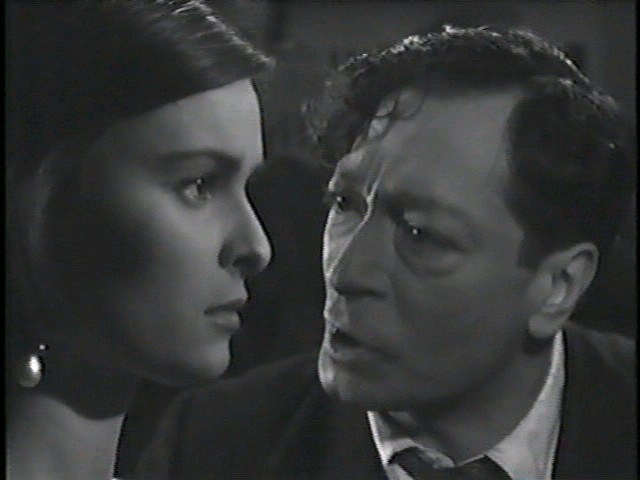“They left him lying there like a dog.”
|

Synopsis:
After accidentally hitting a bicyclist with their car, a wealthy married woman (Lucia Bose) and her lover (Alberto Closas) flee the scene of the accident. When a blackmailer named Rafa (Carlos Casaravilla) threatens to tell the woman’s husband (Otello Toso) that he has seen her with Closas, they fear he has witnessed their crime.
|
|
Genres, Themes, Actors, and Directors:
- Blackmail
- Catalysts
- Guilt
- Infidelity
- Spanish Films
Review:
Death of a Cyclist — the best-known film by Spanish director Juan Antonio Bardem (uncle of actor Javier Bardem) — opens with the tragic titular event, which forces two complacent lovers to question the ultimate survival of their affair. Meanwhile, the weaselly Rafa represents a generalized malevolence towards the bourgeoise; his character — almost a caricature, but an effective one — wants nothing more than to get revenge against what he views as a privileged, careless class. Though a subplot revolving around Closas’ increasingly threatened position as a university professor doesn’t always ring true, it helps moves the plot along to its tragic ending. The final scene is especially poignant — you’ll find yourself muttering “touche” in admiration.
Note: Cyclist won raves at the Cannes International Film Festival, but was inexplicably panned by New York Times reviewer Bosley Crowther upon its American release.
Redeeming Qualities and Moments:
- Luminous cinematography

- Judicious use of editing and close-ups to create emotional tension

- Carlos Casaravilla — who looks and acts uncannily like Peter Lorre — as the creepy blackmailer

Must See?
Yes. This powerful story of guilt and infidelity should be seen by all film fanatics.
Categories
Links:
|




One thought on “Death of a Cyclist / Age of Infidelity (1955)”
Agreed, a must-see.
What’s most interesting about the film – aside from the strong performances, the way it’s photographed, etc. – is the sly construction of the script. When you think it’s going to be a simple story of how an adulterous couple is undone, you’re taken in surprising directions.
What’s least interesting – until you see how she’s manipulated by others – is the wife. She’s gotten herself into the lap of luxury – a situation which even bores her – and nothing will ever be enough. (It makes perfect sense when her lover claims she prefers the “adventure” of them not ever becoming a real couple.)
Actually, the adulterers are a little on the morose side; her husband seems to me a lot more fun (and probably mucho mas ‘playful’, if you follow). Still, it’s a story of moral resurrection – so the plight of the couple is apt.
In one sequence, the piano-playing blackmailer plans to let the s–t hit the fan by proclaiming “Now the fun starts!” It’s a “Fasten your seat belts…” moment in which he becomes a hybrid of Margo Channing, Addison DeWitt AND Oscar Levant. A very interesting, practically non-verbal scene.
Apparently, the Spanish censors prevented director Bardem from releasing the ending he wanted. While it’s intriguing to think of the alternative, it’s difficult thinking of a more satisfying conclusion.